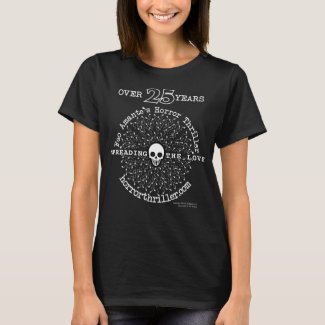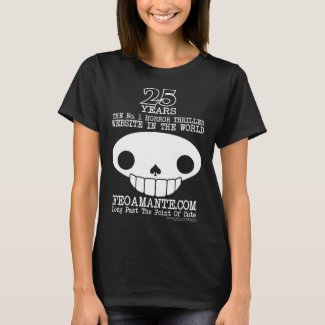 |
 |
Review by Max Glaessner |
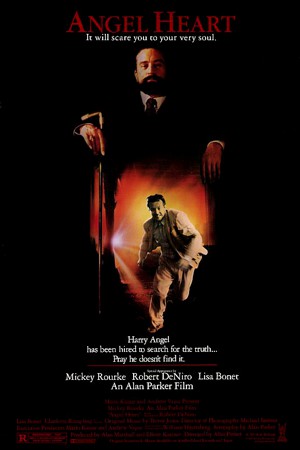 ANGEL HEART - 1987 ANGEL HEART - 1987USA Release: March 6, 1987 Carolco International N.V. / Winkast Film Productions / Union Rated: Argentina, Brazil, Chile, Norway, UK, West Germany: 18 / Australia: R / Canada:18A / Finland:K-16 / France:-12 / Germany, Iceland, Netherlands: 16 / Portugal:M/18 Singapore: R21 / Sweden: 15 / USA: X & USA: R (EDIT) |
||
Accept no imitations. ANGEL HEART is the best merging of Horror/Noir that's ever existed.
If you are searching for a devil of a private detective flick, you really needn't look any further. Even though it may be considered fairly tame by today’s standards, this movie, written and directed by Alan Parker (PINK FLOYD: THE WALL) and based on the novel "Falling Angel" by William Hjortsberg, was received with a good deal of controversy upon it's initial release in 1987.
Exotic sexuality, religious blasphemy, and black magic all caused an uproar from American Censors.
Over time, this Faustian crime thriller nearly faded into relative obscurity. Personally, my first memory of renting this film was from the back shelf of a small local video store. There was only one dusty black VHS copy and the cover itself seemed to beckon with some strange occult force. I went home that night and popped it into my VCR and I haven't stopped watching it since. Now that it's available in fully restored special edition DVD format, repeat viewings are even more enjoyable.
As other reviewers have noted, ANGEL HEART is the kind of movie you really have to watch over and over again to truly appreciate. While it's not necessarily an overly subtle film by any stretch, this is the kind of story that possesses many layers. Just like any great mystery thriller, certain themes and ideas may only occur to you after seeing it several times.
Now, on the subject of themes, one thing to keep in mind is that many of the names of characters in this film are allegorical.
The protagonist, Harry Angel is the first we're introduced to. That's short for Harold Angel, of course, or maybe Herald Angel, if we care to be biblical about it. Angel is portrayed by everyone's favorite tough guy Mickey Rourke (SIN CITY), and true to his outstanding career, Rourke is really type-casted beautifully here. Harry Angel is a slick private dick from 50's era Brooklyn. Just like most of the hard-boiled heroes of that time, he drinks whiskey on the rocks, chain-smokes Camels, and he can sweet talk the dress off a nice lady nurse.
At the beginning of the film, Angel is quietly minding his own business, drinking and smoking in his cluttered office, as a private dick tends to do, when he receives a strange phone call. The caller on the other end of the line is a lawyer named Weinsap (Dann Florek), who requests a meeting with Angel on behalf of a creepy looking gentleman named Luis Cyphre. Again with the names, here, try sounding this one out a little bit and see what you come up with. Cyphre is played by Robert Deniro (BRAZIL, FRANKENSTEIN) who only agreed to take the role after six months of persuasion. Although his screen time is minimal, Deniro brings a sinister quality to this role that is uniquely his own. If you don't believe me, just watch the part where he eats the egg.
Never in the history of movies has someone devoured an egg with such wicked gusto.
Angel meets Cyphre at a Baptist church in Harlem, where there seems to be a scary under-current of activity. For one thing, as Weinsap the lawyer is walking him into the meeting room, Harry notices a mysterious black shrouded figure, wiping blood from off of the wall. Angel is startled at this, but able to accept the rather bizarre explanation he is offered by the attorney.
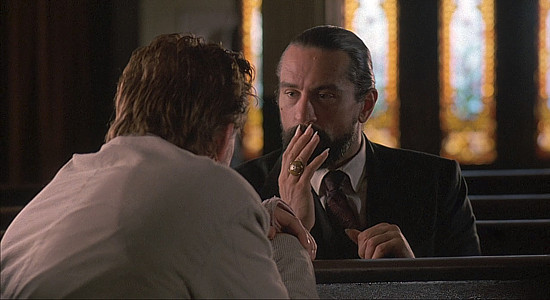
Once acquainted with his new employer, Angel is asked by Cyphre to pursue an old associate by the name of Johnny Favorite. As Cyphre explains, Favorite was a famous crooner who suffered a severe bout of amnesia during World War 2 and was checked into a mental hospital upon his return. The job sounds easy enough at first. Cyphre simply requests that Angel drive up state and "check it out" to see if Favorite is still in the hospital. Apparently, there is a personal matter that Cyphre would like to settle with Favorite, something he believes that Favorite may have forgotten along with his memories.
In the course of his investigation, Angel discovers that Favorite was removed long ago from the hospital by a woman named Margaret Krusmark (Charlotte Rampling: ASYLUM, ORCA, IMMORTAL, BABYLON A.D.). Krusmark was the girlfriend of Favorite, and also an amateur witch. She comes from a wealthy family in New Orleans, where she's rumored to have returned. Krusmark bribed the doctor at the hospital into letting Favorite go.
Angel begins to question the old doc about this, but before he can complete his interrogation the poor guy winds up dead. Angel, now a murder suspect, wants out of the case, but the mysterious Cyphre offers Angel $5,000 to continue. Curious about Cyphre, and the nature of the "debt" that he wants to collect from Favorite, Angel continues with the investigation. In doing so, he also hears of another woman called Evangeline Proudfoot, a voodoo queen who shared a secret relationship with Favorite for many years.
In search of Krusmark and Proudfoot, Angel travels from the coldness of New York to the sweltering bayous of Louisiana. Unlike the book by Hjortsberg, which is set entirely in New York, Parker decided to move the second half of the film to New Orleans. He explained in his DVD commentary that he wanted to do this in part, because New Orleans is such a hot steamy place, and he wanted to move Angel to a location that closely resembled Hell. It's a liberty that for the film (Hjortsberg agreed) turned out to be extremely effective.
Once in New Orleans, the singer Johnny Favorite is still nowhere to be found, while in the meantime Harry is completely engrossed in Johnny's world. He's already met Evangeline's daughter Epiphany Proudfoot, a voodoo queen in her own right and the daughter of Johnny Favorite, played by an extremely attractive Lisa Bonet.
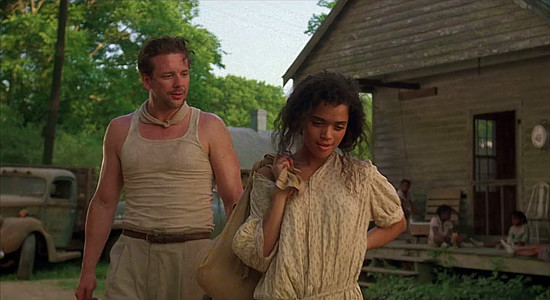
Though he's charmed by this young femme fatale, Angel must balance his attraction with his attention to the case, which soon becomes an increasingly tangled web of voodoo, devil worship, and worst of all - murder. Much like the doctor back in New York, every single person Angel talks to in New Orleans seems to turn into a mutilated corpse. As the bodies pile up, all signs point directly to Angel. In the tradition of many a great noir, our protagonist races to find the enigmatic villain "Favorite", in an increasingly desperate attempt to clear his own name.
Off the top of my head, if there's one heap of praise I would instantly bestow on this film it is surely for the brilliant use of aesthetics. Alan Parker is not known for his contributions to the horror (or crime) genres, but I'm sure nearly everyone can agree, this single contribution succeeds at being both. Parker has stated in his DVD commentary that he set out to make a period focused crime-thriller involving the Devil, yet any involvement of the supernatural in the course of the plot is merely coincidental.
This assertion of his truly makes sense, since ANGEL HEART is in every way a very realist exploration of the super natural thriller. While the movie does rely heavily on an occult premise, many of the real macabre details are expressed through bleak noir imagery.
For instance, the backwards-rotating fan, which we see constantly throughout the film, holds a duo meaning. On a surface level, it's a dark atmospheric noir image, much like the shadows of Venetian blinds that appear in movies like The Maltese Falcon and The Big Sleep. On the flip side, Parker has also described the ominous fans as a symbolic push towards death. Similarly, the iron Otis elevator cage that Angel can constantly be found riding in (during his dreams and flashbacks) is an unsettling and horrific sequence in and of itself. There's good reason for this, as the elevator is always descending, in the direction of Hell.
Yet another atmospheric triumph for ANGEL HEART is the excellence in cinematography, thanks largely to Michael Seresin (HARRY POTTER AND THE PRISONER OF AZKABAN). For this film, Seresin clearly did a lot of hard work, and the effort shows in what basically amounts to shot for shot excellence. The scenes in 50's era New York were shot entirely on location, including everything that you see in Harlem. These scenes in particular are very stirring, and visually reflect what we'd imagine the community to look like at that point in time.
Similarly, Seresin brings a sensitive appreciation for soft but vibrant coloring to locations in upstate New York, Coney Island, and of course, New Orleans.
In New Orleans, Seresin really uses the setting to his advantage and shows us a city submerged in swamp fog and shadow. Through his camera-work, he introduces the Big Easy as a maze of dark corridors, and gas lit street lamps. A place of dreams, in which everything can and will happen. Speaking of dreams, the flash back/dream sequences in ANGEL HEART are really far superior to anything you are likely to come across in standard thriller fare. Instead of clearly announcing: ok he's having a dream now... Harry Angel's horrifying bursts of memory blend seamlessly with the rest of the film, so that they are practically indistinguishable from what's going on in actual reality.
The dream scene, which I enjoy in particular, is the one in which Harry bleeds obscene amounts of blood from his heart. In my mind, this truly terrifying moment is only comparable to a dream I witnessed in one other film, and that's HELLRAISER.
One other thing, along the lines of cinematography that might be worth addressing is the infamous blood-drenched sex scene between Mickey Rourke and young Lisa Bonet. This was the one scene in particular that censors particularly objected to, and several moments from the scene were initially cut for theatrical release, in order to avoid what would have surely been an X rating. As it was the movie barely skated by with an R, and it's been speculated that this movie is what spoiled Lisa's image as a "Cosby Kid". Nonetheless, Parker reminisces that Lisa Bonet was more comfortable shooting the scene than Mickey Rourke, and that she was determined to deliver a good performance. The scene as it stands is a pleasure to watch as it is both bloody and sexy.
No atmospheric horror/crime gem could be complete without one sick and twisted scoring, and the nod in this area goes to Trevor Jones (composer: ARACHNOPHOBIA, FROM HELL, THE LEAGUE OF EXTRAORDINARY GENTLEMEN). Jones deeply understood the descent into madness that occurs in Parker's film, and created music that was more than equal in emotional resonance.
The tormented saxophone that occurs throughout the film is something straight out of your most confusing nightmares. As far as sax solos go, it is really quite agonizing and dark.
Another great usage of music in this film is the song titled "The Girl of my Dreams". Harry is haunted by this song throughout the film and Epiphany reveals to him that it was actually Johnny Favorite's best-known tune. In actuality, the song was written by Sunny Clapp in 1927, and was recorded by Glen Gray and the Casa Loma Orchestra featuring the vocal by Kenny Sargent.
The vocal as we hear it is sped up from 78 rpm to 83 rpm to produce a sound that's warbled and tense. Even with the sweet tone of this song, I think it is spooky and somewhat mocking in light of the scenes that it accompanies.
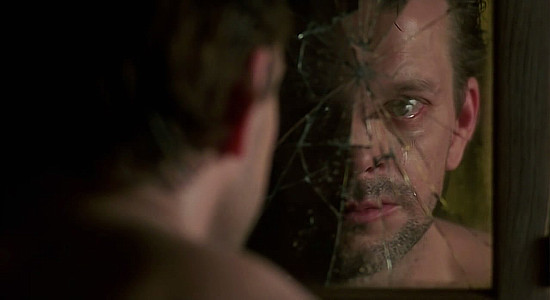
In closing, I guess I'll say that if you are like me, and you frequently travel to the city of New Orleans, you are probably sick and tired of hearing people use the term "Gumbo" as a social metaphor. Usually people use gumbo to describe the diversity of the city, or the many different cultural influences of the city, or the many languages spoken. This is all certainly true enough, it's just that the metaphor has gotten extremely old.
Anyway, as far as ANGEL HEART is concerned, I'm going to have to be kind of lame and say that it is really a big - cauldron sized - gumbo of horror/crime badness. There are guns, broads, chickens, Satan, jazz, blues, cannibalism, and detective voice-overs. What else could you possibly want from a movie? Go out and see this already!
Five shriek girls cuz it's the greatest of its kind!





This review copyright 2009 E.C.McMullen Jr.

|
| GET SOME CLOTHES ON | |
| YOU MIGHT ALSO ENJOY | |||
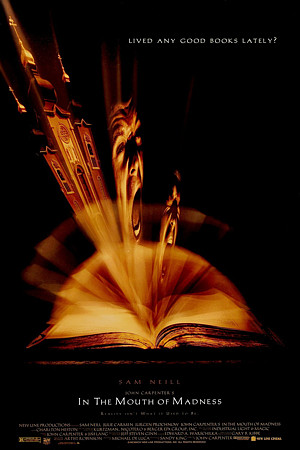 |
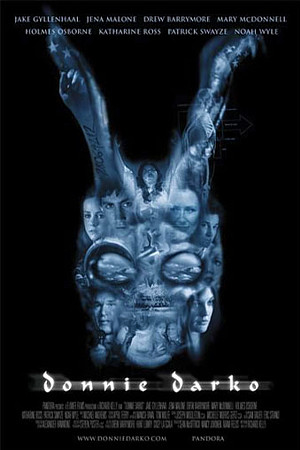 |
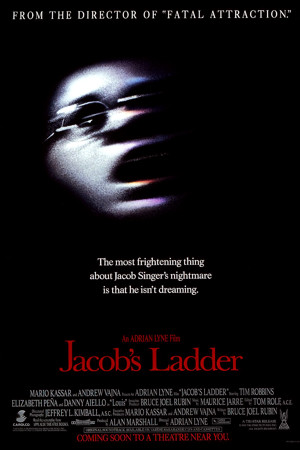 |
|
| IN THE MOUTH OF MADNESS MOVIE REVIEW |
DONNIE DARKO MOVIE REVIEW |
JACOB'S LADDER MOVIE REVIEW |
|
FEO AMANTE'S HORROR THRILLERCreated by:E.C.McMullen Jr. FOLLOW ME @ |
| Amazon |
| ECMJr |
| Feo Blog |
| IMDb |
| Stage32 |
| YouTube |
| Zazzle Shop |
